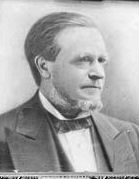John Charles Haines facts for kids
Quick facts for kids
John Charles Haines
|
|
|---|---|
 |
|
| 20th Mayor of Chicago | |
| In office March 2, 1858 – March 22, 1860 |
|
| Preceded by | John Wentworth |
| Succeeded by | John Wentworth |
| Chicago Alderman | |
| In office 1848–1854 Serving with Thomas James (1848–1849)
E.H. Chapin (1849) Alson S. Sherman (1849–1851) J.L. James (1851–1853) William H. Scoville (1853–1854) |
|
| Preceded by | John Sheriffs |
| Succeeded by | Jasper D. Ward |
| Personal details | |
| Born | May 26, 1818 Deerfield, New York, United States |
| Died | July 4, 1896 (aged 78) near Waukegan, Illinois, United States |
| Resting place | Rosehill Cemetery |
| Political party | Democratic Party |
| Residences | Chicago, Illinois |
| Signature | |
John Charles Haines (born May 26, 1818 – died July 4, 1896) was an important leader in Chicago, Illinois. He served as the city's mayor from 1858 to 1860. He was a member of the Democratic Party.
Contents
John Charles Haines: Chicago's Leader
John Charles Haines was born in Deerfield, New York on May 26, 1818. When he was 16 years old, he moved to Chicago on May 26, 1834. There, he started working as a clerk for a man named George W. Merrill.
Early Business and Public Service
By 1846, John Haines became a business partner with Jared Gage. Together, they bought and ran several flour mills. These mills helped provide food for the growing city of Chicago.
Haines also played a big role in setting up Chicago's water system. He began working on this important project in 1854. A good water system was very important for the health and growth of the city.
In 1848, Haines was elected to the Chicago City Council. This is a group of people who help make decisions for the city. He served six terms on the city council. He also served two terms as a water commissioner, helping to manage the city's water supply.
Becoming Mayor of Chicago
In 1858, John Haines ran for mayor of Chicago. He was elected as a Republican at that time. He won against Daniel Brainard, who was a Democrat, by getting 54% of the votes.
He ran for mayor again the next year, in 1859, and won re-election. He defeated Marcus D. Gilman with about 53% of the votes. As mayor, he helped lead Chicago during an important time in its history.
Other Important Roles
After being mayor, John Haines continued to serve the public in many ways.
- He was an elected member of the board for the Chicago Historical Society. This group helps preserve Chicago's past.
- He also served on the Board of Health, which worked to keep people healthy in the city.
- Haines was a founding member of the Chicago Board of Trade. This is a place where people buy and sell important goods like grain.
In 1870, he was chosen to attend the Illinois Constitutional Convention. Here, he helped write a new set of rules, or a new Constitution, for the state of Illinois.
Later, in 1874, he was elected to the Illinois State Senate. This is part of the state government that makes laws for Illinois. He served two terms in the State Senate.
Later Life and Legacy
After leaving the State Senate, John Haines retired from public life. He moved to a small farm near Waukegan, Illinois. He passed away there on July 4, 1896. He was buried at Rosehill Cemetery.
John Charles Haines had a brother named Elijah Haines, who also served in government. Elijah was the Speaker of the House in Illinois.
Today, an elementary school in Chicago, which teaches students from pre-kindergarten to 8th grade, is named after John Charles Haines. This shows how important he was to the city's history.
 | Frances Mary Albrier |
 | Whitney Young |
 | Muhammad Ali |

